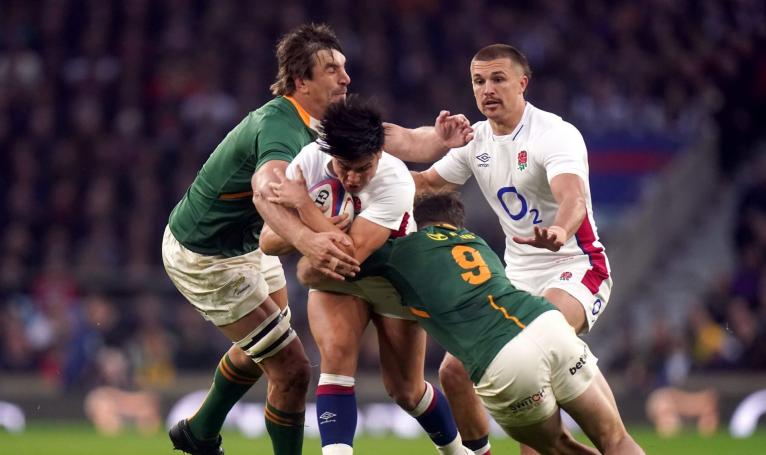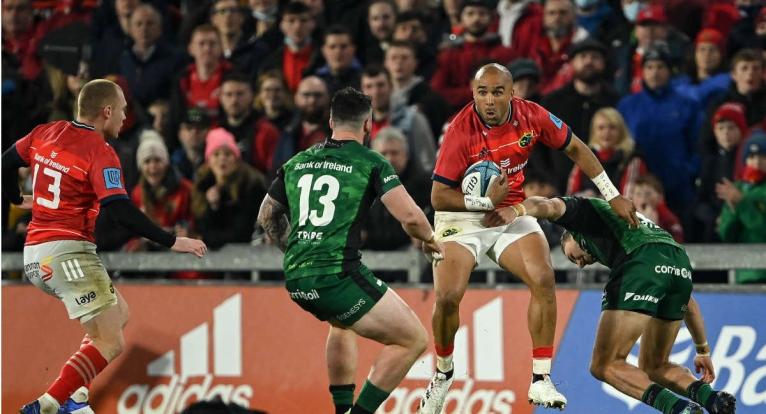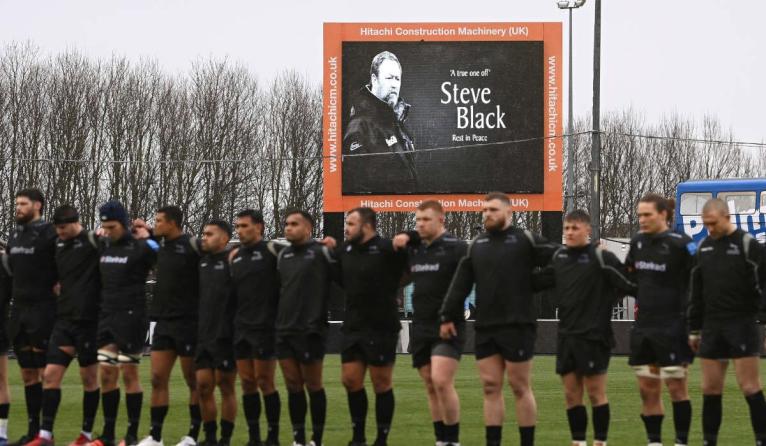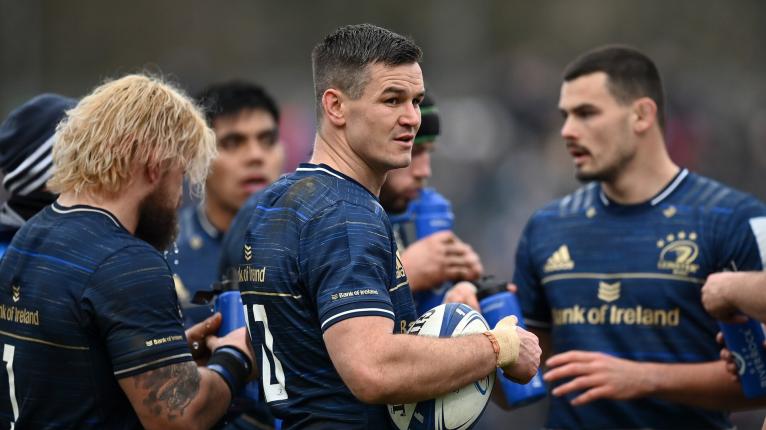After a fallow week which has kept the news agenda ticking over with news of a pay-per-view service for Premiership Rugby and the rumours that Italy were to be replaced by South Africa before swift denials from the Six Nations, we enter the mid-point of the Six Nations with four home nations jostling to regain the initiative from unbeaten France, and a raft of injury-forced departures and call-ups. It promises to be stormy few days on and off the field as national bragging rights are sought…
Tuilagi returns to rescue England?
There is a sense of unease with England right now. In the past 12 months, they have won three of their seven Six Nations games and not beaten any of their Celtic rivals. Eddie Jones is engaging in tit-for-tat with former England players and there is a conveyor belt of hyped-up talent toing and froing as Jones tries to evolve the squad into one which will lift the Webb Ellis trophy in France next year.
One individual who can dole out the hits time and time again is Manu Tuilagi. The Samoan is a force of nature that was first seen in an England jersey 11 years ago as a fresh-faced 20-year-old in the warm-up games for the 2011 World Cup and it is perplexing that he has won only 46 caps in the intermittent period when England and played 117 Tests. Disciplinary problems and a never-ending list of injuries have seen him on the outside looking in, but when fit, he is seen as the panacea to all England’s ills by many.
After two games back for Sale Sharks, where he has looked sharp and provided a noteworthy rib-tickler on André Esterhuizen to announce his return, he has been parachuted back into the England side at Mark Atkinson’s expense for the visit of Wales. What Tuilagi gives England is gainline presence. He wins collisions and that is imperative in the Six Nations where games are often attritional and settled by small margins.
What Tuilagi’s inclusion does is give Wayne Pivac a headache in selection. Does he stick with his one constant in midfield, Nick Tompkins, or does he recall the larger and hugely experience Jonathan Davies to the role with Owen Watkin, who at 6ft 2in and nearly 16st is no waif, a run.
It was Sam Warburton who openly questioned why England have been unable to fill the sizeable Tuilagi gap – with Ben Te’o, Luther Burrell, Atkinson, Ollie Lawrence all selected to provide ballast in his absence, but his call-up proves that until the body finally gives up on the Sale Shark, he will be part of the England midfield. Body willing, expect him to be involved in his third World Cup next year.
Italy are a problem but is South Africa the solution?
No easy games in international rugby? It’s an often-repeated cliché. It’s also absolute rubbish. The Italians have now lost 34 on the spin in this tournament since beating Scotland in 2015. At that year’s World Cup, they ran Ireland to seven points. The subsequent results between the two nations tell their own story: Ireland winning 58-15, 63-10, 56-19, 54-7, 26-16, 29-10, 50-17 and 48-10.
So, no easy games? Are you sure about that?
Far too often we are guilty of unnecessary politeness when it comes to Italy but the truth is that since their arrival into the Six Nations 21 years ago, they have ended up with 16 wooden spoons. Like it or not, it is a problem.
But are the Springboks the solution? On the face of it, yes. They’ve got the players – boy have they got the players. There is the tradition, the favourable time-zone, the fan-base, the lolly that can be generated from any TV deal that would inevitably follow.
Hold on a minute, though. If you bring the Springboks in, isn’t it like robbing Peter to pay Paul? Yes, you have a more competitive Six Nations but you also have devalued the uniqueness of a Lions tour to the Southern Hemisphere in the stroke of a pen.

That’s not all. The November Series, well what will be the point of that from here on in? South Africa are a major draw for that. We haven’t even mentioned how predictable and joyless the Rugby Championship would become in their absence.
So yes, Italy is a problem. But is it a big enough one to justify reshaping the oldest and for many of us, the greatest rugby competition on the planet?
The answer doesn’t necessarily lie with Italy leaving and South Africa joining. The answer lies in June and November. Ask any rugby fan to reminisce about previous Six Nations campaigns and they’ll recall the where, the when and the how. Ask them to tell you the winners of, say, the summer and autumn Tests in 2016 and 2018, and you’ll struggle for a response.
That’s what needs fixing. Turn the June and November internationals into some form of global league – as has been mooted – and you have added meaning to every game. Heck, Italy might even win of them. Remember their most recent major scalp? In November 2016, they eked out a 20-18 win in Florence. A team called South Africa were their victims.
Feed Zebo
There has been a little chuckling across the Munster province about Simon Zebo since the cherished try machine returned home from Racing 92. To put it more bluntly, people have been gossiping about the extra poundage he is reckoned to be carrying since his Parisian sojourn.
French clubs are not known for their stringent nutrition plans, but while folk might peer keenly at Zebo’s midriff, they cannot question his undimmed finishing prowess.
On Friday night, with play-off-chasing Edinburgh in town and a mighty gale blowing at Thomond, Zebo touched the ball five times and scored three tries.

The first was a run-in, and could have been scored by one of several Munster players on the overlap. The second and third were excellent finishes, as Zebo scorched past Moyano up the left flank. His tries sealed a game that hung in the balance.
Owing to that try-laden spell at Racing, it has been close to five years since Zebo last played for Ireland. His first season back in Ireland has been mired with injury, covid-enforced postponements and a red card that was later rescinded. There are no guarantees he makes a match-day Test squad right now – not with the kind of weaponry Andy Farrell can wield in his back-three – but what a boon to have Zebo back in the mix and back among the tries. You might say he looks hungry.
The rugby world mourns the passing of Steve Black
You can tell a lot about how someone has lived their life when someone passes. This was true when news broke of Steve Black’s untimely passing hours before the game against Exeter Chiefs. All we can surmise about Black is that he was the most genial of characters. Indeed, anyone who crossed his path was touched by his caring, compassionate nature.
Black was not born with a silver-spoon in his mouth. Brought up in a working-class family in Newcastle, he ran the doors in the Toon’s lively nightclub scene and was used to dealing with lively characters. It was for that reason that he was probably drawn to rugby’s curious mix of masculinity and vulnerability. After a successful first spell with the Falcons, he was coaxed by Graham Henry to venture down to South Wales to help the national team before the 1999 Rugby World Cup and was integral to their 10-match unbeaten run.
Henry entrusted ‘Blackie’ to motivate the 2001 British & Irish Lions, where his reputation touched players from all four participating nations. As a proud Geordie, it was, however, his home town of Newcastle that lay closest to his heart. As well as working with Newcastle United, he was a mentor to young Jonny Wilkinson up at the Falcons in a long connection with the club which brought them promotion and then a first Premiership title. He latterly helped the likes of Danny Cipriani with his mental and physical preparation. The former England fly-half paid tribute to him as, ‘the greatest’.

The XV spoke to Black in November 2020, where he gave an insight into his philosophy. “Kindness has a deep place in high-end, elite-level sport. Maybe in the past people haven’t wanted to talk about it too much because they’ve actually thought it was a bit twee.
“I remember at the Falcons when we signed Inga Tuigamala and Pat Lam. Inga said to me, ‘Blackie, you’re the first person I’ve heard, other than back home in the (Pacific) Islands, that speaks about loving each other and really caring for each other. It makes an incredible difference’.
“Each person needs to know that they matter, they matter to each other… we’re going to stay connected and reinforce the value that you have with us.”
Many have felt that connection with Black and have been touched by his kindness. Thousands more will mourn his passing for he left an indelible mark on all who met him. Rest in pace, Black.
Where are Edinburgh?
This past week was always going to paint a truer picture of Edinburgh’s emergence under Mike Blair than the opening half of a season in which they have played few teams of note.
For the first time since Blair reimagined them as an attacking force, they crossed the Irish Sea and locked horns with two of the heavyweight provinces, Leinster and Munster.
That they left Ireland on successive weekends without a point to show for their toil will frustrate Edinburgh. They suffered bonus-points defeats at the RDS and Thomond Park, conceding over 60 points in total, but they will have learned much about where their evolution is right now.
Against Leinster, ruthlessness – or the lack of it – was their downfall. Plenty red-zone possession, precious few points to show for it. They blew one certain try with a poor pass from Henry Immelman to Ramiro Moyano and had another disallowed through Mesulame Kunavula’s double movement. They had enough ball in the early throes to stress the champions and did little with it.
In Limerick, decision-making let them down as much as execution. Too many poor choices and silly errors feasted upon by Munster, in true Munster fashion, as the rain sheeted down and Storm Eunice gusted heartily.
But what Blair will take from his Irish voyages is the competitiveness of his team, minus around 20 players through Six Nations duty and injury. They started very well against Leinster, with their close-quarter bludgeoning. They had a disastrous opening at Thomond, conceded four breakdown penalties on the spin and a Fineen Wycherley try, but fought their way back to within touching distance of a draw before more sloppiness allowed Munster to kill them off.
Those experiences will do Edinburgh the world of good, and they needed them with so much going so right this quickly in Blair’s reign. They may not yet be true title contenders, but they have shown a depth that did not exist in previous seasons, with more caps and more internationals on the field than Leinster put out, and Puma Emiliano Boffelli continuing to shine brightly.
The losses will wound them and stall their momentum, but Edinburgh are, emphatically, heading in the right direction.
This is the year Leinster’s reign can end
Munster need a trophy. So do Ulster. Leinster don’t. Well, at least they won’t lose sleepless nights if a season passes without the URC landing in their cabinet. They’ve won it the last four seasons and just about everyone suspects they will make it five-in-a-row this season.
The first thing you have to say about Leinster is that at this time of year, you are likely to see two of them. One Leinster side wears green shirts and calls itself Ireland. These are the names you know best: Porter, Healy, Kelleher, Sheehan, Furlong, Ryan, Baird, van der Flier, Conan, Doris, Gibson-Park, Sexton, Henshaw, Ringrose and Keenan.
The other team isn’t too shabby, either. Certainly it was too good for Ospreys on Saturday, James Lowe scoring a wonder try, while another name, Scott Penny’s, got introduced to a national audience, the game being television live on RTÉ, the state broadcaster. It was Penny’s score that ensured Leinster got a bonus point. Penny, by the way, now has 20 tries in 34 appearances for the province.
What’s significant, though, is that all 34 games have been in the URC. It is a sign of Leinster and Irish rugby’s depth of backrows that the openside can’t even get a game at Champions Cup level, never mind one for Ireland.

That depth isn’t in every position, though. While Lowe impressed for them on Saturday, it may be at a cost for his club. He’ll be whisked away for international duty now. What if he gets injured there? What if others do? Even if they don’t, the strict Irish player management system ensures that all their players get a certain number of minutes in each season.
Their international requirements – November tests, Six Nations games and the summer tour – limits the amount of time that a Sexton, Furlong or any first-choice Ireland player, can line out for their province. So, even when they do wear blue, the Champions Cup takes priority.
All of which leaves the likes of Penny to carry the load in the URC. They’ve done that job supremely well. Indeed they top the table.
But can they stay there with Ulster, Munster and a resurgent Glasgow breathing down their neck? Sexton and Furlong have played only five times for Leinster this season; just three of those games coming in the URC. With Europe coming up, Leinster’s priority will be on the Champions Cup rather than the routine league fixtures that often slip under the radar.
Yet that’s where they may slip up. Ulster have already beaten them once this season; Connacht got one over them at the RDS last term. All three of their Irish rivals have home games to play against Leinster in the remainder of this regular URC campaign. More to the point, Ulster and Munster lose fewer of their front-liners to international rugby, thereby they can pack their team with their best players for the mundane URC matches. That gives them a chance of a top two spot and the prized home semi-final. And that is where Leinster can finally be caught.




Comments
Join free and tell us what you really think!
Sign up for free